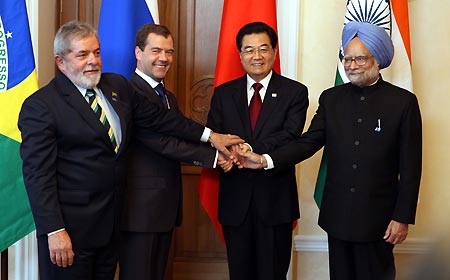|
 |
|
Chinese President Hu Jintao (2nd R) poses for a group photo together with Brazilian President Luiz Inacio Lula da Silva (1st L), Russian President Dmitry Medvedev (2nd L), and Indian Prime Minister Manmohan Singh during the first formal meeting of BRIC (Brazil, Russia, India and China) leaders in Yekaterinburg, Russia, on June 16, 2009. |
For the first time in more than one year, China reduced its holding of U.S. Treasury bonds, and experts told Xinhua Tuesday that move reflected concern over the safety of U.S.-dollar-linked assets.
Data from the U.S. Treasury showed China pared its stake in Treasury bonds by 4.4 billion U.S. dollars, to 763.5 billion U.S. dollars, as of the end of April compared with March.
Tan Yaling, an expert at the China Institute for Financial Derivatives at Peking University, told Xinhua that the move might reflect activity by China's institutional investors. "It was a rather small amount compared with the holdings of more than 700 billion U.S. dollars."
"It is unclear whether the reduction will continue because the amount is so small. But the cut signals caution of governments or institutions toward U.S. Treasury bonds," Zhang Bin, researcher with the Institute of World Economics and Politics of the Chinese Academy of Social Sciences, a government think tank, told Xinhua.
He added that the weakening U.S. dollar posed a threat to the holdings of U.S. Treasury bonds.
The U.S. government began to increase currency supply through purchases of Treasury bonds and other bonds in March, which raised concern among investors about the creditworthiness of U.S. Treasury bonds. The move also dented investor confidence in the U.S. dollar and dollar-linked assets.
China, the biggest holder of U.S. Treasury bonds, is highly exposed. In March, Premier Wen Jiabao called on the United States "to guarantee the safety of China's assets."
China is not the only nation that trimmed holdings of U.S. Treasury bonds in April: Japan, Russian and Brazil did likewise, to reduce their reliance on the U.S. dollar.
However, Tan said that U.S. Treasury bonds were still a good investment choice.
Hu Xiaolian, head of the State Administration of Foreign Exchange, said in March that U.S. Treasury bonds played a very important role in China's investment of its foreign exchange reserves. China would continue to buy the bonds while keeping an eye on fluctuations.
Zhang said it would take months to see if China would lower its stake. Even so, any reduction would not be large, or international financial markets would be shaken, he said.
Wang Yuanlong, researcher with the Bank of China, said the root of the problem was the years of trade surpluses, which created the huge amount of foreign exchange reserves in China. It left China's assets tethered to the U.S. dollar, he said.
He said making the Renminbi a global currency would cut China's demand for the U.S. dollar and reduce its proportion in the trade surplus.
(Xinhua News Agency June 16, 2009) | 